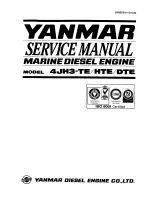
PERIODIC SERVICE
12
EN
GLISH
B
Air bleeding the fuel system
To avoid personal injury;
A
Do not bleed a hot engine as this
could cause fuel to spill onto a hot
exhaust manifold creating a danger
of fire.
Air bleeding of the fuel system is required if;
A
after the fuel filter and pipes have been detached and
refitted;
A
after the fuel tank has become empty; or
A
before the engine is to be used after a long storage.
[PROCEDURE]
1. Fill the fuel tank to the fullest extent. Open the fuel
filter lever.
2. Loosen air vent plug of the fuel filter a few turns.
3. Screw back the plug when bubbles do not come up
any more.
4. Open the air vent plug on top of the fuel injection
pump.
5. Retighten the plug when bubbles do not come up any
more.
B
Checking the fuel pipes
To avoid personal injury;
A
Check or replace the fuel pipes after
stopping the engine. Broken fuel
pipes can cause fires.
Check the fuel pipes every 50 hours of operation. When if;
1. If the clamp band is loose, apply oil to the screw of the
band, and tighten the band securely.
2. If the fuel pipes, made of rubber, become worn out,
replace them and clamp bands every 2 years.
3. If the fuel pipes and clamp bands are found worn or
damaged before 2 years' pass, replace or repair them
at once.
4. After replacement of the pipes and bands, air-bleed
the fuel system.
A
When the fuel pipes are not installed, plug them at
both ends with clean cloth or paper to prevent dirt from
entering. Dirt in the pipes can cause fuel injection
pump malfunction.
(1) Fuel filter lever
(2) Air vent plug
(3) Fuel filter pot
(A) "ON"
(B) "OFF"
(1) Clamp band
(2) Fuel pipe
E.book 12 ページ 2011年5月31日 火曜日 午後3時45分
















































